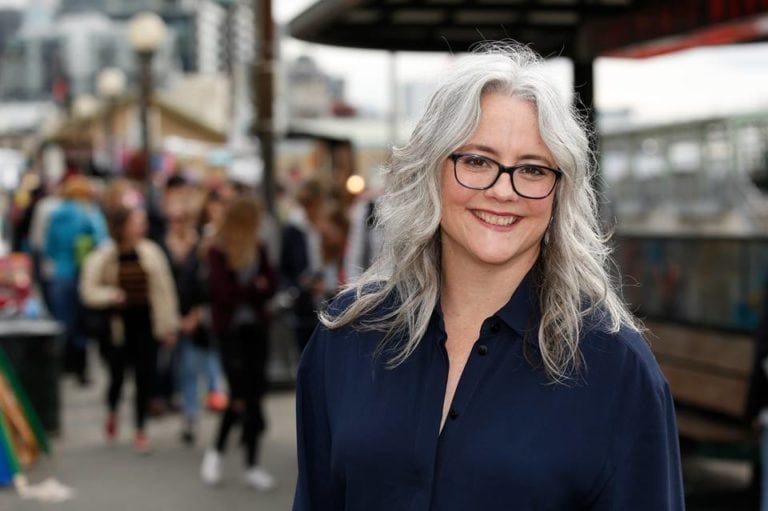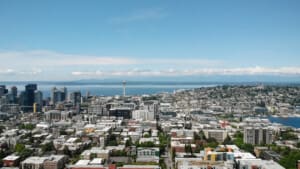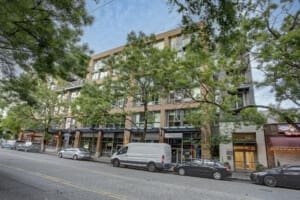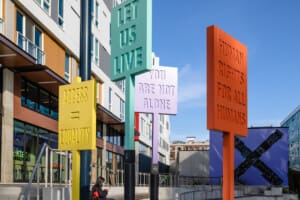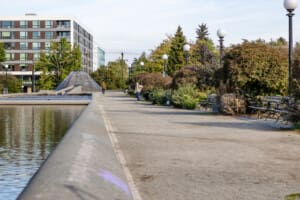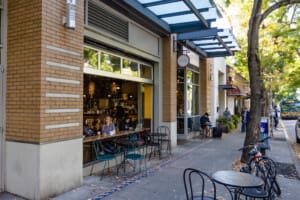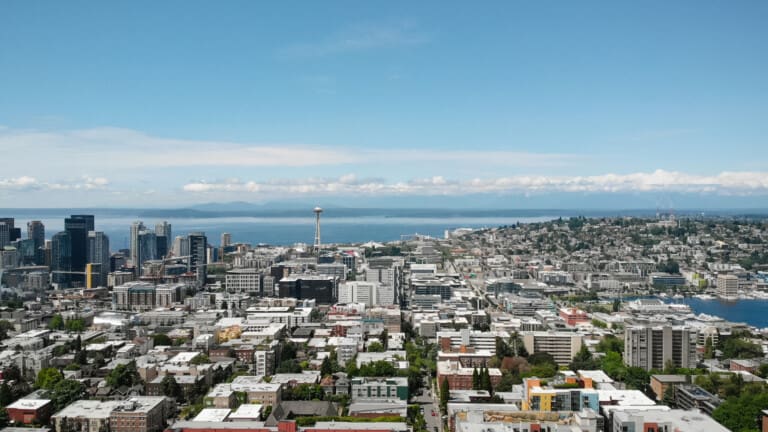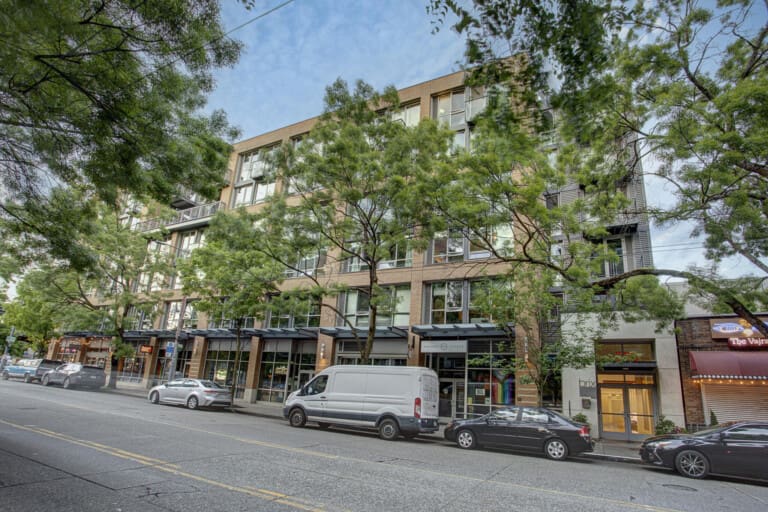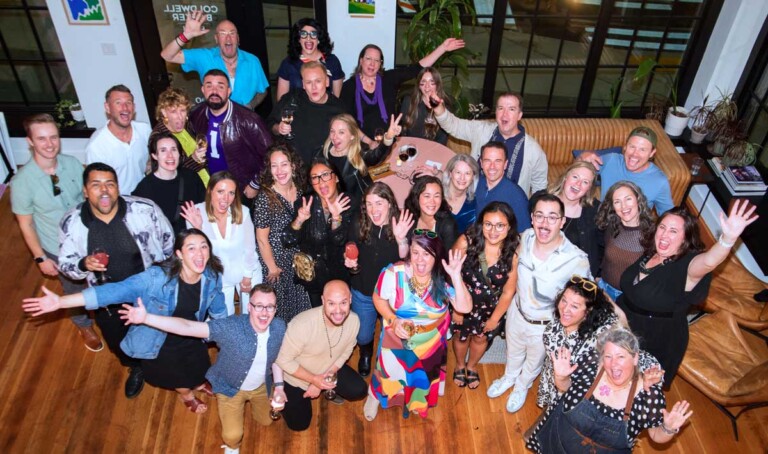The moment you meet Cary Moon, you know you are dealing a whip-smart person. We know from experience. Moon is an urban planner, which gives her an advantage when discussing systemic solutions to Seattle’s growing pains. Her answers to our questions, however, show that her comprehensive plans extend beyond the obvious connections we listed above and really does call for a holistic approach to making Seattle the best it can be. This is a long read, but it’s a compelling one even for those who may not agree with every position Moon takes.
Arts Support and Funding
The wry question in the local art scene these days is, “How fast are you going to move to Tacoma?” Seattle needs a thriving arts community to be a truly cosmopolitan city. The Arts & Cultural Districts program is in its nascence, and its efficacy is still in question. How do you see yourself as the mayor increasing and supporting our local arts community?
Arts are not an amenity for wealthy people to consume, they comprise an essential element of urban life, where we examine who we are, confront our challenges, and imagine what we might be as a society. And if that is not enough in itself, arts in Seattle contribute at least $450 million (2012 figure) to the local economy and employ more than 11,000 people. I am committed to supporting, expanding, protecting and enriching arts production in our city. Our creative culture is one of the most important facets of Seattle life, and we are at risk of pushing our artists and musicians out of our city altogether, due to the affordability crisis. We cannot let this happen, and must identify solutions like expanding low income arts housing especially in communities of color, and subsidizing spaces for arts production and performance in new development as we grow. The Liberty Bank model is a good one to replicate, so is the Tashiro Kaplan arts building, and so is the 12th Ave Arts building development. Arts are crucial to our city’s identity, our shared cultural understand and our very ability to invent and imagine.
For the last twenty years, I have worked with community leaders, stakeholders, and activists to develop policy solutions to some of Seattle’s biggest challenges. As a civic leader, I have worked on many issues ranging from housing affordability to democracy reform, and building a progressive vision and statewide platform for an economy that works for all of us.
As founder and director of the People’s Waterfront Coalition, I led a coalition with multiple partners and thousands of members to envision, plan, and build the public will for the new 22 acre civic space on Seattle’s public waterfront, now being built by the City of Seattle, and led the advocacy for a sustainable, transit based solution to viaduct replacement. With Charles Mudede, I developed a deep analysis of Seattle’s affordability crisis, and promoted a comprehensive solution set, significantly shifting the public debate. With Progress Alliance and partner organizations, I led the effort to envision and develop the strategic plan for the launch of the Democracy Hub, a new coalition housed at Win-Win that will coordinate a transformative plan to reclaim our state democracy from monied interests and reassert the power of the people.
Affordable Housing/Homelessness
Housing, homelessness, and affordability are often entwined but have different solutions. Without a doubt the housing levy dollars have not been making its way back into the community as it has in the past. Rental advocacy is starting to make its way through the community with different responses. Regardless, housing is a global issue and there is not a lot we can do about rising home prices. However, there is a lot we can do to help our homeless and create better housing options for those who make below the average income in Seattle. Specifically, how would you better manage the money from the housing levy, create downpayment assistance programs, and provide permanent housing for our homeless community? Considering that drugs, alcohol and mental health issues are intertwined within this community, what is your holistic approach to dealing with homelessness in Seattle?
Housing Affordability
Seattle has become one of the most expensive cities in the country. More than half of Seattle renters pay more than they can reasonably afford for housing. Too many are living on the edge, just one unexpected bill away from not making rent and facing eviction. People of color, LGBTQ people, young people, low income working families and seniors are hit first and hardest, being pushed out of our city. That is not who we are.
People who work in Seattle should be able to afford to live in Seattle. If we don’t solve this problem now, in just a few years the majority of Seattle’s workforce — and our children — will be forced to live outside the city. We have the tools to start fixing this problem; we just need the collective will and courage to stop favoring the interests of profiteers and start putting people and families first.
Solutions:
- Increase tenants rights to provide stability and protections to renters. The Seattle Renters Commission is a good first step, but we can do more to help renters – especially now that renter households now outnumber homeowner households. We need to look at best practices in rent stabilization strategies to find a model that could work here.
- Prevent evictions of families with children and safeguard transitional housing for families and victims of domestic violence.
- Exponentially expand affordable housing from only 6% of Seattle’s housing market toward a goal of four times this share. Cities that have solved this problem show that more public and nonprofit housing is an essential tool to achieving overall stability in housing costs.
- Pursue viable alternative housing options for working people in the “missing middle” like duplexes, triplexes, rowhouses, backyard cottages, congregate housing, co-ops and co-housing while maintaining the unique character of Seattle’s neighborhoods. Community land trusts, if we can do them at scale, offer a great path to homeownership.
- Implement targeted taxes or other mechanisms to deter corporate and non resident real estate speculation to strengthen neighborhoods.
Homelessness
We need to address the root causes of our city’s surge in homelessness to get ahead of this problem. We need a shared strategy, and a collaborative effort across agencies and service providers, to synergize the solutions we know can work to help people back into secure housing as efficiently as possible.
Solutions:
- Prioritize long-term supportive housing options and housing first approaches. Rapid rehousing vouchers are hard to use in this market and offer only a temporary reprieve; this funding ends up in the hands of for-profit landlords, leaving families to face the same unaffordable rents after their vouchers expire.
- Work with shelter providers to identify how to help long-term residents transition to more permanent housing.
- Provide more low-barrier shelters that allow the right mix of options to match needs, such as allowing pets and enabling couples to stay together.
- Address the immediate need for emergency shelter with temporary solutions like more self-governed tiny house villages hosted by churches and neighborhoods as we get more lasting solutions in motion. We as a city need to identify surplus publicly owned land and make appropriate sites available to sanctioned tent encampments and Tiny House Villages and support increasing their number.
- Expand shelters for women and victims of domestic violence that are essential to their survival.
- Invest in treatment for mental health and drug and alcohol dependency
Transportation
Seattle consistently passes transportation levies to support buses, bike lanes, sidewalk expansion, and more. Yet our roads are in poor condition, especially in the non-core neighborhoods, and resources are not distributed evenly across the city. How are you going to better manage the city’s transportation dollars?
Transit & Access
Traffic congestion is one of the biggest growing pains in our city. We need to address housing costs and transit access together. Working people are being pushed out of Seattle to chase affordable housing in places that are not served by transit, which leaves them isolated from their communities and services. Lack of transit options forces workers to drive, compounding congestion on our streets. In addition to improving transit options, we need to focus on safe streets, walkable neighborhoods, a basic bike network and a strong freight and delivery network. We need to be efficient with our limited street space and make alternatives to driving more viable for commuters.
Solutions:
- Add more bus transit and protected bus lanes because when transit is fast,convenient and reliable, people use it.
- Make walking and biking as a more viable form of transportation with a completenetwork of protected bike lanes and safe sidewalks for walking.
- Be ready with bold solutions to keep downtown flowing when the tunnel busescome to the surface in 2019. The One Center City plan must focus on equity, on protecting the Chinatown/ ID neighborhoods and on improving transit service broadly throughout the city.
- Recognize disability rights as civil rights. Almost 20% of people live with a physical or mental disability. We will ensure the rights of those with disabilities are given the same attention as other civil rights.
- Review the SDOT budget in its entirety , and make sure we invest in street improvements with a racial and social equity lens from here forward. There has been disproportionate attention and investment in more privileged neighborhoods, and we need to correct this historic imbalance.
Policing
Despite five years of federal oversight under a consent decree, the Seattle Police Department’s reputation for biased policing and excessive force persists. This view is not helped by projects like the Bunker and the Youth Jail. At this point, the most visible actions by the SPD typically involve quashing protests and demolishing homeless encampments–not the image one would expect from a Sanctuary City. As mayor, what reforms would you push for in policing and its overall place and perception in the city?
My three priorities for accomplishing this are:
A. Ramp up training in de-escalation techniques, strengthen the force’s commitment to avoid use of force by establishing stronger protocols and expectations, and expand and deepen training in racial equity and anti-bias training. We were all born into a deeply biased society, where the legacy 250 years of slavery followed by 100 years of segregation is not going to be replaced without a lot of ongoing work by all of us. Lasting change comes from changing how we think, how we perceive one another, what we do when we feel threatened, and the very culture of the department.
B. Finalize the details, fully fund, and implement the vision for community oversight of police via the Community Police Commission. This process will provide a long-term venue for transparency, constructive dialog, trust building, and developing effective innovations like our LEAD program. It is essential for the cultural change we need.
C. Finalize the police contract, and replace retiring officers with new hires with multi-lingual skills, four-year degrees, and broader cultural competencies. Establish adequate staffing levels for the future which allow more time to be spent on pro-active neighborhood patrols, addressing hot spots more effectively, community policing, training in alternatives to use of force, and anti-racist training.
The public service of policing requires public trust. The robust transparency and oversight as proposed by the Community Police Commission can be a healthy and constructive place to start rebuilding that trust. Is it pleasant to have the community looking over your shoulder, pointing out how we are all falling short? No, but if we are to become a city that truly stands for inclusiveness and fairness there is going to be lots of discomfort, across the board. So let’s get used to it and move forward. I would be proud to lead us toward becoming the most educated, most skillful, least bigoted police force with the lowest use of force in the nation.
Southeast Seattle
Every political season candidates come down to Rainier Valley for a photo op and then disappear for another four years. Meanwhile the resources in our very wealthy city do not make it south of the ship canal. There is a long history of redlining through actual practice or out of habit in our city. Many mayors have had pet projects they have installed in south Seattle but have not created the infrastructure in the neighborhood to support these projects. As a sanctuary city many of the residents we want to protect reside south of the ship canal. Will you be the mayor will make an effort to create safer streets, add curbs and sidewalks, mow the city owned portions of the mediums, and truly make a positive impact to the the neighborhood? Or are you a photo op person?
Yes. I believe fundamentally that we need a democracy and an economy that work for everyone, not just the wealthy few. Confronting this inequality in our systems and institutions is THE reason I am running for mayor, and the foundation of all the solutions I am proposing. This transformation will require some fundamental shifts, described below more comprehensively. Immediately, we need to: implement progressive taxation to ensure we have the funds we need to invest in schools/ transit/ infrastructure/ services for the next generation, because this is the most essential way to level the playing field long-term; second, use a racial and socioeconomic equity lens in every budgeting/ spending decision, to ensure we are correcting historic inequities in how we invest public resources; and third, create and prioritize a strategic economic development plan focused on building family wage jobs and providing ladders to success for lower income folks and communities of color. Here are my broader platform priorities and how I plan to improve our city.
An Economy That Shares Prosperity
Our state’s trickle-down approach to economic growth benefits the super wealthy and large corporations at the expense of the rest of us. Over the last four years, City Hall has proposed several new property tax and sales tax increases, which have only compounded the fact that Seattle has one of the most regressive tax structures in the country. This means those at the top pay a much smaller share of their income in taxes than those at the very bottom. We in Seattle need to lead the charge to reverse this by holding the wealthiest among us accountable to pay their fair share, and investing in the public resources that support the wellbeing of everyone.
Solutions:
- Institute a tax on luxury real estate.
- Implement a capital gains tax on households earning more than $250,000 to fund affordablehousing, education, transit services and jobs in the clean energy sector.
- Provide stable funding for enforcement of labor standards to penalize businesses that refuseto play by the rules protecting their workers.
- Continue to work together with Seattle labor leaders in protecting collective bargaining and strengthening the voice of workers , both essential parts of the fight to reverse income inequality.
Racial Equity
Seattle must stand for racial equity and the liberation of all people. But too many outcomes show we are missing the mark. White Seattleites need to come to grips with racial and economic inequality and the barriers that exist in our systems and institutions — and we all must work in partnership across race and class to dismantle them. Our city must step up its accountability to communities of color and disenfranchised communities, including transgender and gender diverse people. We must amplify the important work already done by Black leaders, Native leaders, immigrant leaders and people of color from the civil rights era through the Black Lives Matter movement and complete the transformation to true inclusion and power sharing.
Solutions:
- Provide equitable resources for education across all neighborhood schools , including more after school, childcare, and summer programs in communities of color, because every child deserves the chance to pursue their dreams — no matter their zip code.
- Rebalance who has a seat at the table in every public decision-making body, and establish standards that ensure we share power across race, class and gender in city boards, commissions and all departmental leadership positions.
- Invest in the next generation of leaders by offering training in civics, organizing and advocacy to young leaders of color.
- Prioritize restorative justice and alternatives to incarceration instead of building a new youth jail.
- Follow through on community oversight of police and push for continued progress toward anti-racist policing and a fairer criminal justice system.
- Stand strong in protecting immigrants and refugees as a Sanctuary City, and pursue further solutions such as a legal defense fund for our neighbors and families being persecuted by ICE.
Gender Equity
When women are secure and self-reliant, families, businesses and communities thrive. Despite our shared progressive values, Seattle lags behind the rest of the developed world on gender pay equity. Women should not have to work more hours to make ends meet, stay in abusive relationships due to financial dependency, or continually fight to maintain access to health care.Solutions:
- Require equal pay for women in equal jobs throughout the city.
- Provide at least 12 weeks of paid family leave when a family has a new child or has to care for a sick family member.
- Protect women’s access to health care in our city.
- Require annual reporting on gender equity for all city departments and Seattle businesses with more than 50 employees.
Small Businesses & Economic Development
Seattle is becoming more expensive and access to entrepreneurship is more and more out of reach. Homegrown Seattle businesses are being replaced by corporate chains. Increasing commercial rents, congested streets, inadequate transit and regulatory challenges make survival for small local business tougher and tougher. Small, locally owned businesses are the engine of an economy that builds local prosperity, access to opportunity and resilient communities. We need to protect and nurture and grow small businesses, and ensure a level playing field.
Solutions:
- Offer technical assistance to new entrepreneurs and small business owners, especiallyentrepreneurs from communities of color and immigrant/refugee communities.
- Support municipal broadband because access to high-speed internet is essential and mustbe universally available.
- Discourage displacement of minority owned businesses instead of abandoning them toface gentrification on their own.
- Stabilize commercial rents for locally owned small businesses.
- Develop effective strategies for local sourcing, local production, and buy local programs.We all benefit from robust local economies and homegrown industries.
Guiding Principles
As Mayor, I will uphold the following principles:
- Inclusive Leadership: I believe in an inclusive and welcoming Seattle, and I am committed to justice, equity and sharing power across race and class and gender. As Mayor, my leadership team will be at least half women, LGBTQ and people of color.
- Accountability: I will spend the first six months working in coalition with leaders inside and outside city government to develop a shared vision and action agenda and commit to reporting back to citizens on ongoing progress.
- Balanced Access: Only one day a week on my calendar will be available to big businesses.The others will be reserved for citizens, small businesses, and community groups. City leadership must be accountable to future generations and the public good over the interests of large corporations.
- Creative Invention: I will invite artists, writers, inventors, historians, futurists and young people to contribute ideas, learn from one another and experiment with new approaches to our civic challenges and our city’s future.
- Collaboration: Transformative ideas can come from anyone, and the combined knowledge and commitment of the public employees of the City of Seattle is a valuable resource. The scale of our shared challenge requires we work together with openness and respect.
Education Funding
Now, more than ever, Washington state needs to step up and fully fund education. The resulting impact to funding education will be an increase to the property taxes here in Seattle. The bulk of the fight is happening in Olympia. How do you see yourself working with Olympia to make sure Seattle gets the resources it deserves without harming poorer homeowners?
Seattle is a city of haves and have nots, and every day the divide grows. It is time for white Seattleites to come to grips with the racial and economic advantage we were born into, see the barriers that exist in our systems and institutions, and join the leaders and activists from communities of color to help dismantle them. Our city must step up its accountability to communities of color and disenfranchised communities. Seattle’s prosperity should provide shared opportunity and success for everyone. As mayor I would instill the value of racial equity and commitment to sharing authority as a priority in every decision-making body.
We can address this issue by investing more resources in schools, specifically prioritizing neighborhood schools in communities of color and low income communities, because every child deserves the chance to pursue their dreams — no matter their zip code. We need more pre-K, after school, childcare, summer programs, and mentor-based enrichment programs to bridge the investment gap and ultimately the achievement gap. Every public school should be a high-quality one, with the resources it needs for students to succeed.
Further, though, the city and school system must work with students to develop their own racial analysis, understand the structural systems of oppression in operation today, and learn the organizing and activist skills to dismantle the systems. Power concedes nothing without a demand, and unstoppable, effective organizing for justice is essential to teach. Racial inequity has been baked into our systems for centuries, and every step of progress has been excruciatingly hard won; our generation and the next must accelerate progress toward true liberation of all people.
Finally, the City of Seattle can support advocacy leaders within the school system who are fighting to the racial achievement gap with helping facilitate, empower and celebrate this important work.
The City of Seattle can partner with Seattle Public Schools in a variety of ways. First and foremost is to support the unified effort to secure adequate revenue for schools in Olympia, as required by the McCleary decision, by working with legislators and the Governor and the many tireless advocacy organizations. Winning this, and soon, is the single most important goal. Second is to work as a funding and operational partner on all the specific programs where the City has the resources or skills to help: safe routes to schools, providing ORCA cards for students and supporting transportation services; school arts and mentor based enrichment programs; the Home from School partnership, and helping fund the dozens of community based programs working with youth. These many programs provide an essential lifeline and ladder to security to many young people, especially those who come from immigrant, low income, refugee, homeless, people of color, or Native American communities.
Sanctuary City
For all the reasons above, there is reason to be skeptical that Seattle can be more than well-meaning in calling itself a Sanctuary City. A housing crisis, questionable policing, unaddressed histories of racial bias and segregation (and anti-immigrant sentiments) that persist to this day all seem to prevent us from providing safe haven for people fleeing violence elsewhere. As mayor, what would you do to lay the foundation for being a Sanctuary City, in a way that integrates with the many other problems our city faces?
To live the vision of the sanctuary city we claim to be, we need to stand strong in protecting immigrants and refugees. This requires action through our policing and justice systems — by refusing to cooperate with ICE, protect data of vulnerable people, and provide legal defense funds to families being persecuted — and action in how we operate as a city. We need to implement the practical and bold solutions described in my platform or we will continue on the path toward a city of haves and have nots, a place where more and more of us are not sure we belong and feel our roots are tenuous at best. With our city’s wealth, our creativity, our spirit of innovation, our shared progressive values, and our sense of connectedness, we have tremendous responsibility to model inclusiveness and a commitment to the well-being of us all. We have a duty to be the living beacon of hope, and stand in stark contrast to Trump’s nightmare vision for America.
Seattle must stand for racial equity and the liberation of all people. But too many outcomes show we are missing the mark. As mayor I want to call out the racial and economic inequality and the barriers that exist in our systems and institutions, working in partnership across race and class to dismantle them. We need more commitment, in all facets of government, to balance power across race, class and gender in who has a seat at the decision-making table, and commit to balance in allocation of resources. We need to stay on track with racial equity and anti-bias training in the police force and throughout the criminal justice system. And we need to prioritize restorative justice and alternatives to incarceration instead of building a new youth jail.
Keep track of Cary Moon’s campaign on her official Facebook page and http://carymoonformayor.com/


